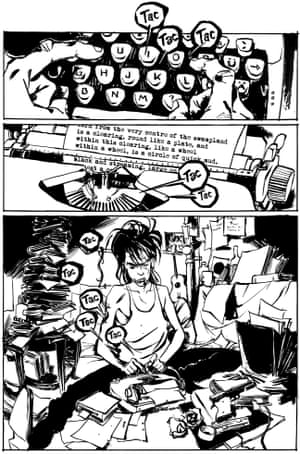Reinhard Kleist’s graphic biography is full of visual delights, but the musician’s wit – crucial foil to his own myth-mongering – is less apparent
he cover already stakes out the franchise: Cave lopes towards us, a Marvel superdude crossed with a Reservoir Dogs gangster. Any moment, he may reach into a holster concealed in his jacket and … and what? Whip out the script of a lecture, ready to deliver edification to a bunch of grey-haired lit graduates? No, this graphic biography is not interested in that Nick Cave. It’s interested in the crazed outlaw who screams, “Hands up who wants to die!” and attacks the front row with a bloodspattered microphone stand.
Cave endorses the book, noting that it’s woven together from “half-truths and complete fabrications” but applauding its vision. “Closer to the truth than any biography, that’s for sure!” A typical example of the liberties Kleist takes is the scene where Tracy Pew, the bassist of Cave’s early 1980s band the Birthday Party, first dons his signature cowboy hat. In truth, it was given to him by a friend to wear in a music video. In Kleist’s version, Pew steals it from a liquor store when he and Cave go on a spree of shoplifting and destruction. No opportunity is spared to emphasise what bad seeds these young punks were.
The book veers between reality and phantasmagoria. When Cave as a lonely astronaut sends a paper plane love note down to his girlfriend on Earth, it’s corny but touching too. Then we’re back to a conventional historical account of the ambitious Australians forming their group, outgrowing the audience in Melbourne and relocating to London where they find that promoters are dismissive and punk is passé. In these scenes, the dialogue can be leadenly expository. “I didn’t come to England for this,” laments guitarist Rowland Howard. “I thought it would be different!” Yet such spoonfeeding is preferable to Kleist’s attempts to tease out the deeper significance of Cave’s career decisions. “There’s that fear of standing still, the unbridled compulsion to travel new paths,” he glosses when Cave is about to break up the Birthday Party and form the Bad Seeds. “To tear the old into pieces. To kill that which clings. And plant the seeds of something new in its ashes.”

As with I See a Darkness, Kleist’s graphic biography of Johnny Cash, there’s a dogged focus on the big themes of destiny, self-destruction and the redemptive power of song. Cave’s real-life trajectory has been towards sobriety, meditation and domesticity, but Kleist gets round this by adding a narrative frame in which the characters from Cave’s past works – the lynched Euchrid Eucrow from the novel And the Ass Saw the Angel, the murdered Elisa Day from his duet with Kylie Minogue “Where the Wild Roses Grow”, et al – come back to berate him for his maltreatment of them. “I’m merely your wayward likeness, and then you punish me for it by killing me as it pleases you!” declares the electrocuted prisoner from “The Mercy Seat”. While high-flown archaism has long been one of Cave’s fortes, something has clearly gone awry here in the shifts from his rhetoric to Kleist’s German imitation of it to Michael Waaler’s translation of Kleist back into English.
The real strength of Mercy on Me is the artwork. In his Johnny Cash book, Kleist was often tempted to remould Cash’s burly physique into a more spidery shape. Cave genuinely is that spider and Kleist relishes every gangly pose. Moreover, he’s enthralled by Cave’s face and captures its expressions with panache. Among many highlights are a full-page portrait of the teenage Nick sullenly determined to escape bourgeois conformity, and a superb evocation of the shock-haired exile typing his gothic novel in a Berlin garret just big enough to accommodate his wasted body, piles of papers, some booze and a gun. Kleist does equal justice to the older Cave – thin-haired, wrinkle-browed and strangely dignified.
Indeed, Kleist pours so much love into his hero that there seems little left for the other players. Rowland Howard was God’s gift to caricaturists but is oddly bland here, as is Cave’s longtime paramour Anita Lane. Lydia Lunch and PJ Harvey are unrecognisable.
As in I See a Darkness, spectacular natural phenomena – storms, rain torrents – symbolise Road-to-Damascus epiphanies and mental crises. The orgy of drug abuse and sleepless obsession that went into the composition of And the Ass Saw the Angel is reimagined as Cave drowning in a whirlpool, ink injected into his veins, while Anita rows towards him in a canoe, vainly trying to pull him aboard.
Aside from the nodding plastic dog on the dashboard of a stolen car, pirate Nick whittling his wooden leg, and a dancing rehab nurse, the book is not generously endowed with humour. Which is a pity, because Cave is such a funny writer and his wit has always been the crucial foil to his own myth-mongering. Mercy on Me offers plentiful visual delights and will no doubt be an essential purchase for ardent fans, but the less committed may find 328 pages of angst-ridden Bad Boy a stretch. For balance or a chuckle, check out the wickedly disrespectful rendition of Dr Cave in Krent Able’s Big Book of Mischief. The great man’s forehead is even higher there, and in colour.
• Michel Faber’s The Book of Strange New Things is published by Canongate.
• Nick Cave: Mercy On Me is published by SelfMadeHero. To order a copy for £12.74 (RRP £14.99) go to bookshop.theguardian.com or call 0330 333 6846. Free UK p&p over £10, online orders only. Phone orders min p&p of £1.99.










